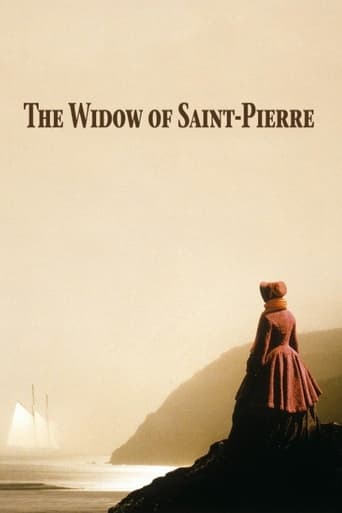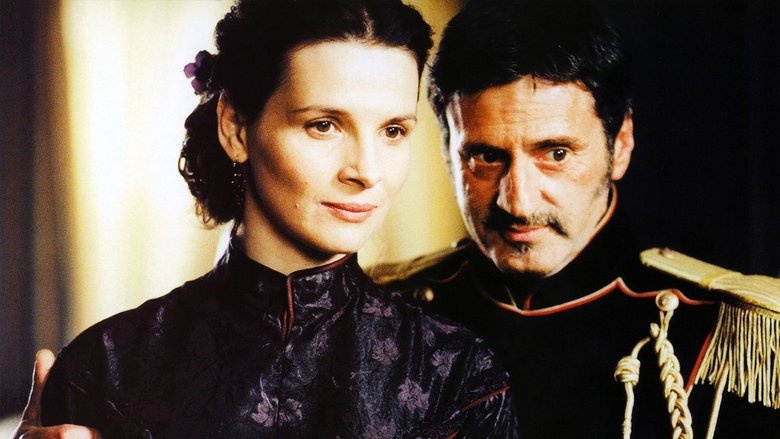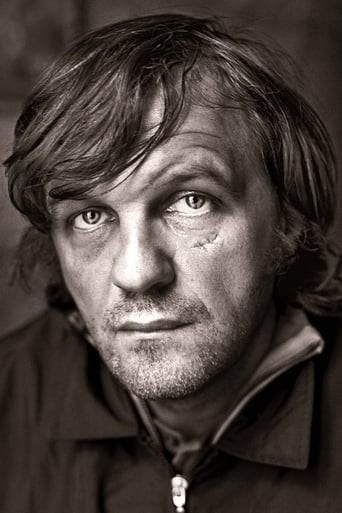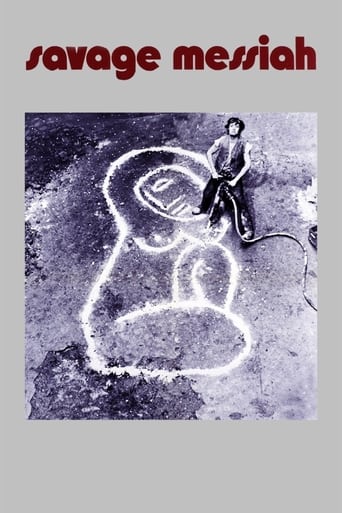

The Widow of Saint-Pierre (2000)
In 1850, on the isolated French island of Saint-Pierre, a murder shocks the natives. Two fishermen are arrested. One of them, Louis Ollivier, dies in custody. The other, Neel Auguste, is sentenced to death by the guillotine. The island is so small that it has neither a guillotine nor an executioner. While those are sent for Auguste is placed under the supervision of an army Captain.
Watch Trailer
Cast
Similar titles

Reviews
This story has more twists and turns than a second-rate soap opera.
An old-fashioned movie made with new-fashioned finesse.
While it doesn't offer any answers, it both thrills and makes you think.
A clunky actioner with a handful of cool moments.
In 1849, in the Archipelago of Saint-Pierre et Miquelon, the drunken Ariel Neel Auguste (Emir Kusturica) and his partner Louis Ollivier (Reynald Bouchard) kill for a futile motive (to see if he is fat or just big) the fishing boat captain Coupard (Michel Daigle). Nell, who stabbed the victim, is sentenced to die with his head severed in the guillotine while Louis is sentenced to hard labor. During the transportation to the prison under the custody of Captain Jean (Daniel Auteuil), there is an accident and Louis dies. While spending his days in the cell waiting for the guillotine and the executioner, Neel is invited by the captain's wife Mrs. Pauline (Juliette Binoche) to help her in her garden and becomes her protégé. Later he has a process of rehabilitation helping the locals in minor works and becomes very popular in the island. When he saves the building Café du Nord and her owner from sinking in the sea, his popularity increases and nobody but the governor and politicians of the council wants his death. Neel marries Eleontine Jeanne-Marie, but sooner he is informed that the ship Marie Galante has just left Martinique bringing a guillotine. Now the Governor and politicians need to find an executioner in the population to execute the sentence."La Veuve de Saint-Pierre" is a beautiful dramatization of a story of rehabilitation and intolerance. I do not know whether this event is partially true or not – there are references in Internet to this story but in sites that I can not trust – but this movie is wonderful. The story and screenplay are engaging and very well written with powerful lines; the direction of Patrice Leconte and the performances are top- notch, with Juliette Binoche extremely beautiful and elegant as usual and showing a magnificent chemistry with Daniel Auteuil; the cinematography and costumes are wonderful. Based on my adjectives, it is unnecessary to say that I loved this movie. My vote is eight.Title (Brazil): "A Viúva de Saint-Pierre" ("The Widow of Saint-Pierre")
The Widow of St Pierre is set in 19th Century French Novia Scotia or Newfound Land. The premise of the story is of a sailor who, on a somewhat drunken escapade with a colleague, murders a man and is arrested, found guilty and sentenced to death - The only crux of course is that there is no guillotine nor an executioner to carry out the execution and so a request must be sent to France for the necessaries to carry out the sentence.In the meantime the prisoner is detained at the states pleasure in a cell in the local police captain's (Daniel Auteil) home. The captain is a quiet independent man dedicated to his job, who loves his wife more than anything and will do anything she asks, so when Madame le Captain (Juliette Binoche) takes sympathy on the prisoner, reckoning that everyone deserves a second chance, her wish is granted and the prisoner is soon helping her with her greenhouse and doing good deeds all over the island.The real turning point comes when the prisoner stops a runaway cart saving a villagers life in the process, and soon the majority of the ordinary folk are adamant that this man has truly repented and that the sentence should no longer be carried out. However the guillotine has been dispatched from Martinique and the authorities are adamant that the will of the Republique be served.The climax of the film deals with the conflict and tensions between the ordinary people and the authorities along with the developing relationships between the prisoner and Madame and The Captain (and of course the gossip and innuendo surrounding the relationship) and how the whole thing resolves itself. It is one of those pleasant films dealing artily with duty, steadfastness, honour and dignity and it's carried off nicely albeit perhaps a little stretched out and gloomily in the end.None the less I'd give it 6/10 for ambiance and the acting of the main characters especially Auteil (Previously best known as Ugolin from The classic Pagnol Florette Movies) who, like a good Bordeaux, is only improving as he ages.
It seems to me that this movie was made as an attack on the death penalty. While I have no problem with the use of the death penalty, I strongly agree with the major contention of the film. That is, once a person is sentenced, by the time they are put to death a lot of time has passed and they may not be the same person--and may no longer deserve to die. In the case of the film, the delay was BRIEF compared to our modern penal system, as the delay looked to be about two years. During this interim time, the convicted man did so much to help those around him that there was little will, except among some idiots in the local government, to execute him. The film is very interesting and gives us insight into life on the isolated island of St. Pierre (a French possession near New Foundland) and because the story, it seems, is based on a true story! I liked the film because it dared to be different, had something to say and featured excellent acting and dialog--and this combination definitely doesn't happen very often.
One man kills another senselessly on the French island of St. Pierre off the coast of Newfoundland and is sentenced to be executed by guillotine. Unfortunately, the island has no guillotine and has to import one from Martinique. The murderer will live for several months before it arrives. In the meantime, the wife of the army captain, played by Juliette Binoche, takes an interest in the murderer, played by director Emir Kusturica, and helps him become a better man. By the time the guillotine arrives, the people of St. Pierre no longer want the execution. But the government is insistent, as it would make them look bad to their French superiors. It's a great premise. Unfortunately, Leconte does little with it. It's fairly boring through most of its run, and its points are obvious and not especially interesting. If the film was specifically meant to be anti-capital punishment, it cheats too much. The man Kusturica kills has no character, no family, no one who loves him. He's killed basically because he's a fat nobody and he's quickly forgotten. After the incident, Kusturica is basically a perfect gentleman. It's not too hard to argue against executing this fellow. Juliette Binoche, one of my favorite actresses ever, only barely gets to demonstrate her considerable talents. I do like her wardrobe, though.











